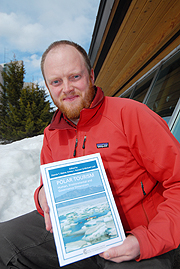|
A professor at the University of Northern British Columbia has published a book describing the precarious balance that exists between the three major factors affecting sustainable tourism at the Earth’s extremities: governance, the environment, and people.
“There are other books on polar tourism out there, but this is the first to give such comprehensive and even geographic coverage of the key dimensions in the areas of human, environment, and governance,” says UNBC professor of Outdoor Recreation and Tourism Management Patrick Maher. “We can start drawing attention to the fact that more balance is needed. Policy-wise, we can’t strictly cater to the environment, and we can’t strictly cater to the needs of humans either.”
More than a dozen researchers from around the world contributed to Polar Tourism: Human, Environmental, and Governance Dimensions, which was edited by Dr. Maher, Emma Stewart of Lincoln University in New Zealand, and Michael Lück of AUT University in Auckland.
“We need to recognize that the environment is very important and connected to the human population, but we can’t just lock it up. In Canada's Arctic, the Inuit already know this,” says Dr. Maher, who released a book last year questioning the sustainability of cruise tourism in the polar regions. “For example, if government, in the interest of protecting wildlife, says ‘No hunting in Sector X’ it may result in far, far fewer people actually going to that place. And so, over time, humans lose their relationship with the area and, in effect, stop caring about it. This supports the notion that you can’t protect what you don’t know.”
As a result of global warming, there is an increasingly long tourist season, greater access to polar regions, more environmental hazards, and constantly changing tourist attractions. Tourism in polar regions also involves a growing number of stakeholders, such as tourism businesses and tourists, governments and regulatory bodies, researchers, and the public who live there. Discovering the political balance between the needs of human inhabitants, wildlife, and the environment is vital for overall and long-term sustainability.
"There is the need for some development to allow economic growth - some sort of economics for a remote region," says Dr. Maher. "Governments need to stop the endless rhetoric about how important the Arctic is to us and actually put some sensible policy into place."
|
|
Media Downloads
Click on a thumbnail to access a high resolution image of Dr. Patrick Maher.
 Contact: Contact:
|
